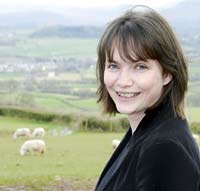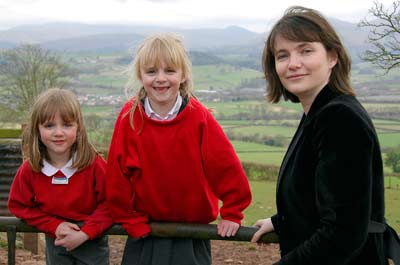Leading Lib Dem talks farming

Being married to a farmer has helped shape the views of Kirsty Williams, the first woman to lead a Welsh political party.
Visiting Kirsty on the Friday of a week that included speaking at the Liberal Democrat’s spring conference at Harrogate, giving a lecture to Cardiff University students, the tiredness showed.
But somehow she found the energy to listen to excited reports from daughters Angharad (7) and Carys (4) about their day at school (her youngest Rachel is too young for full-time school).
There was even a moment to swap high heels for wellies and join husband Richard Rees in the lambing shed to check how many more of the 1400 ewes at Pencrug Farm near Brecon had delivered their lambs safely. When things were less hectic, she used to exploit the fact that she has very small hands to assist with some difficult births.
But Kirsty readily admits that her farming skills are limited, which is hardly surprising, as she is the daughter of a librarian and graduated in American Studies after attending Manchester and Missouri Universities.
“I really had very little knowledge of farming until I was selected to stand for the Brecon and Radnorshire constituency in the first election for the Welsh assembly,” says Kirsty, who was born in Taunton in 1971.
The learning curve steepened in the summer of 1998 when her political mentor Richard, now Lord, Livesey, the then Westminster MP for the constituency, introduced her to the man she eventually married in 2000.
The fateful meeting was at Gwynfe Village Show, where Richard and his parents were exhibiting sheep. They both admit the conversation between non-farming Kirsty and non-political Richard was far from easy at first. But further encounters followed as they both toured the summer show circuit – Kirsty to canvass and Richard to collect prize cards.
“Eventually at one of these shows he invited me for a drink in the beer tent and that was the first tentative step on the road to that led to marriage.”
But before that stage was reached, Kirsty was elected an assembly member, and she had learned a lot about farming from her future husband’s family, knowledge she has found invaluable for representing a rural constituency.
In her first assembly term she made a name for herself as an eloquent orator, though some claimed that her youth – she was under 20 years old – would be a handicap. But she was re-elected in 2003 with an increased share of the vote.
In the 2007 assembly elections, she polled over 50% of the vote in what had previously been a marginal constituency. She is the only long-serving assembly member who has attracted an increased vote at each election.
But when the Labour Party failed to win a workable majority she upset many Liberal Democrat supporters by her opposition to moves to create what was described as a rainbow coalition of Lib Dems, Conservatives and Plaid Cymru. Some even used the epithet “wreaker” (wrecker??).
But she insisted that the plan would be bad for her constituents and the people of Wales, though it would almost certainly have given her a ministerial portfolio.
At the time some leading political commentators suggested her stance would stop her winning the election to succeed Mike German as leader of the Welsh Liberal Democrats. But on 8 December last year it was announced that she had picked up 59.9% of members’ votes.
She was first attracted to the Liberal Party when she was 15 and living with her parents in Carmarthenshire (at school in Llanelli she was one year behind former Catatonia singer Cerys Matthews).
In the 1997 General Election she contested the parliamentary seat of Ogmore in Glamorgan and finished third (a passionate advocate of devolution, she now insists Westminster is off her radar), later getting selected as prospective candidate for Brecon and Radnorshire.
In 2006 she was named as the Member to Watch in the Welsh Yearbook Political Awards. In March 2009 she won the Devolved Parliamentary and Assembly Member of the Year Award. This year she has also spoken in an Oxford Union debate and been on a Question Time panel.
But television appearances have not impressed her three daughters, to whom she is just mum. She acknowledges that there are never enough hours in the day or days in the week to be mum, but is annoyed when every interview she does turns to the question of balancing her political career and parenthood.
“I don’t recall that being an issue for David Cameron or Nick Clegg,” she told the Oxford Union. “I don’t recall people expressing wonderment that a father of two, three or four children could balance their family commitments with their work. That’s the gap between the idea of equality and the practice in modern Britain.”
Being married to Richard, who farms 520 acres of hill land with his two brothers, has given Kirsty Williams a clear picture of the problems of farmers and rural communities.
“The rural economy is inextricably linked to the prosperity of farming,” she says. “Farmers not only feed the public and take care of the landscape, when they make profits they spend the money locally. When they do not the whole economy suffers, people move away and local shops, schools and hospitals close.”
Her marriage has provided her with a first-class barometer of conditions within the industry, and detailed knowledge she can use to defend family farming during Welsh assembly debates.
“I understand all about the burden of red tape and bureaucracy, and how tired farmers have to tackle endless paperwork after a long day outside.
“I have seen first hand the impact of rising input costs on family businesses, and we have discussed the huge problems that compulsory electronic identification of sheep will cause on hill farms like ours.”
There is the UK’s greatest concentration of sheep per hectare in her constituency and she knows that many farmers are planning to cut flock sizes. It is already happening on her home farm.
She had the ammunition to attack the Welsh rural affairs minister when she decided to cut funding for agri-environment schemes, making it more difficult for farmers to sign management agreements. Her own family is on the waiting list.
That said, Kirsty thinks that, generally, the minister, Elin Jones, is doing a pretty good job for Welsh farmers, under the watchful eyes of members like her who have strong rural links.
“We need vibrant rural communities but they will be lost if farming and protection of the environment and countryside does not pay.”
She believes the decision to base single farm payments on historic livestock numbers rather than land area gave Welsh farming the best possible deal. But she knows that the arrangement will not last for ever.

Being leader of the Welsh Liberal Democrat Party and of the party at the assembly in Cardiff is a massive job, which is likely to become even more demanding in the run up to European elections and the next General Election.
This will mean spending even less time enjoying the spectacular views of the Brecon Beacons from the windows of Pencrug Farm, or joining Richard and the girls on walks around the cattle and sheep.
While commuting to Cardiff three days a week is exhausting, Kirsty remains determined to resist taking the easy option and spending nights away when the assembly is in session.
“I could not have a political career without Richard’s total support and his patience when the phone never stops ringing. All family members have been incredibly supportive.”
Having given up some of her precious at home time to talk to Farmers Weekly, and being aware of her end of week tiredness and sometimes feisty response to personal questions, it did not seem wise to ask how she reacted to being voted “The Sexiest Female Liberal Democrat” back in 2006.
Instead it was a case of joining her and Richard in admiring the conformation of the new Belgian Blue stock bull he had bought the week before.
